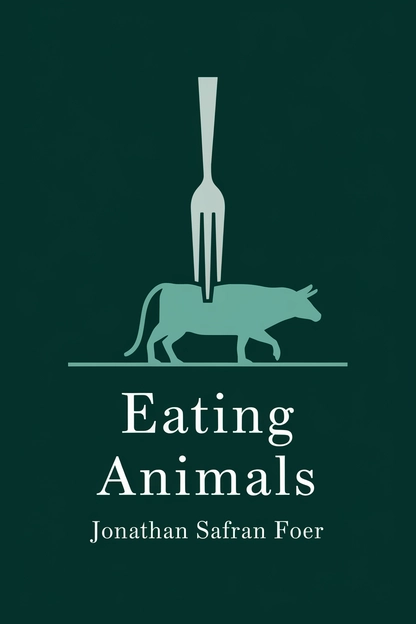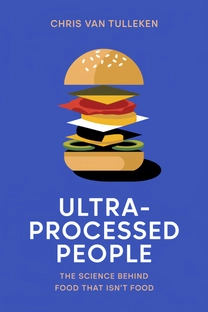
Eating Animals
by Jonathan Safran Foer
Brief overview
This book explores the moral, environmental, and personal dilemmas embedded in eating animals. It raises pressing questions about how and why humans consume meat, highlighting the realities of factory farming and offering a deeper look at our relationship with food. Through personal anecdotes and investigative reporting, it calls on readers to reflect on the impact of everyday meals.
Introduction
Imagine holding a simple plate of food and asking where it came from. This moment of curiosity can lead us to surprising truths about how animals are raised, slaughtered, and delivered to our tables. In this book, Jonathan Safran Foer sets out to answer these questions with candor and compassion.
At first, Foer’s search stemmed from a very personal place: he wanted to know what kind of world he was offering to his newborn child. In piecing together his grandmother’s war stories, his own experiences, and interviews with farmers, he reveals a tangled web of tradition, habit, and industry that shapes our diets.
Foer isn’t out to preach. Instead, he explores the daily choices that can be life-affirming or destructive. As you move through his arguments and evidence, you’ll see how our most routine actions—like eating breakfast—can have global consequences.
Our Complex Relationship with Animals
From childhood, many of us love certain animals and fear or ignore others. Foer confesses to disliking dogs for large parts of his life only to realize how that feeling had been passed down through generations. Later, by adopting a dog, he discovered its individuality and emotions.
This personal anecdote symbolizes a broader question: why do we protect some animals while eating others? Pigs and chickens, for instance, show intelligence and curiosity, yet they rarely earn the affection we lavish on pets. What does that say about our moral lines?
Culture, tradition, and convenience all shape these choices. It’s not simply logic or necessity; it’s the stories we tell. Exploring those stories helps us see how easy it is to overlook the suffering of so-called 'food animals' while championing the well-being of pets.
What is Eating Animals about?
Eating Animals by Jonathan Safran Foer delves deep into the complex intersections of our dietary choices with ethical, environmental, and personal dimensions. Written with a poignant blend of personal narrative and investigative journalism, the book challenges readers to reconsider the implications of meat consumption. Through detailed examinations of factory farming practices, Foer explores how the industry prioritizes efficiency over empathy, resulting in devastating consequences for animals, workers, and ecosystems.
The book raises essential questions about responsibility, ethical consumption, and our cultural stories surrounding food. It emphasizes the inherent dissonance in how we value different animals and points to the grim realities lurking in the production lines of factory farms. By connecting these dots, Foer urges a more conscious approach to eating, advocating for alternatives that respect both beings and the environment. This is a compelling, eye-opening narrative that beckons readers to participate in a broader, much-needed conversation on sustainable living.
Review of Eating Animals
Jonathan Safran Foer's Eating Animals is a masterful exploration of the meat industry, melding personal storytelling with meticulous research. The book carefully dissects the stark realities of factory farming, painting a vivid picture of its ethical and ecological footprint. Through Foer's insightful narrative, readers gain an understanding of the hidden costs of their dietary choices, beyond just personal health to include broader social and environmental consequences.
Among the book's strengths is its ability to break down complex issues into digestible narratives that resonate with readers on a personal level. Foer's reflections on family, cultural traditions, and personal habits highlight how deeply food is intertwined with identity. The book's practical takeaways provide readers with stepping stones toward more informed and compassionate eating practices. Without alienating non-vegetarian readers, Foer offers feasible alternatives to the prevailing system.
Written in an engaging style that balances accessibility with depth, the book caters both to casual readers and those seeking a deeper understanding of food ethics. Highly recommended for anyone questioning the sources of their meals, it challenges you to rethink the "normal" and consider meat consumption with a more critical eye.
Who should read Eating Animals?
- Concerned citizens interested in environmental sustainability who recognize the role dietary choices play in ecological balance.
- Ethically-minded individuals seeking to make food choices that align with their values of compassion and justice.
- Environmental activists looking for well-researched, real-world examples of the impact of industrial agriculture.
- Educators desiring a resource to foster discussions on food ethics, sustainability, and consumer responsibility.
- Parents interested in shaping their children's understanding of food and encouraging thoughtful dietary habits.
About the author
Book summaries like Eating Animals
Why readers love Mindleap
10-Minute Book Insights
Get the core ideas from the world's best books in just 10 minutes of reading or listening.
Curated For You
Discover your next favorite book with personalized recommendations based on your interests.
AI Book ExpertNew
Chat with our AI to help find the best book for you and your goals.
Reviews of MindLeap
Love how I can get the key ideas from books in just 15 minutes! Perfect for my busy schedule and helps me decide which books to read in full.
Alex R.
The summaries are incredibly well-written and the audio feature is perfect for my commute. Such a time-saver!
Jessica M.
Great app for personal growth. The insights are clear and actionable, and I love how they capture the essence of each book.
Chris P.
The app is beautifully designed and the summaries are top-notch. Definitely worth every penny!
Sarah K.


